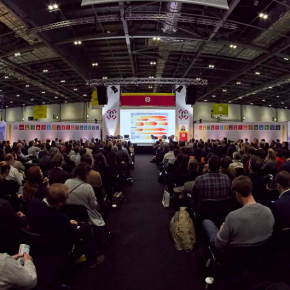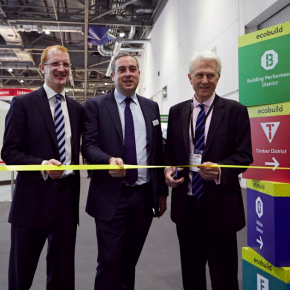
Reflections and looking ahead with ecobuild owner Martin Hurn
 Martin Hurn, the new owner of the ecobuild event, has reflected on how the first year under his tenure went. He analyses highlights, how criticisms were addressed and looks towards future plans for the event.
Martin Hurn, the new owner of the ecobuild event, has reflected on how the first year under his tenure went. He analyses highlights, how criticisms were addressed and looks towards future plans for the event.
ecobuild 2018 is over – how has the first event under independent ownership been?
Overall, it has been a fantastic success. And it is only when we look back over the last 18 months that we can truly assess and reflect on the scale of what we have achieved.
As soon as we acquired ecobuild in December 2016, we declared our intentions to give the event back to the industry and to reaffirm its commitment to innovation and sustainability. However, from the vey outset, we knew we had a number of immediate hurdles to overcome to make ecobuild the event we felt it could – and should – be under independent ownership.
We were under no illusion, for example, that ecobuild had begun to be seen as a ‘dying brand’ and a ‘faceless corporate’ event. Of course, that’s the opposite of everything we wanted it to be known for – we’re passionate about the fact that ecobuild is the event for the industry, created and curated by the industry.
Fortunately we saw independent ownership as a fantastic opportunity to take a step back and review the event in each and every aspect. So under the new management of Futurebuild Events we set about addressing and improving the perceptions of the event – while creating an experience that offered real value and represented the most critical issues facing the built environment.
It’s safe to say that we have firmly achieved what we set out to achieve. Visitor numbers are up five per cent, exhibitor rebookings are at a five year high, and the event has been praised for the strength and focus of it content programme and interactive feature builds and showcases.
So, you met the expectations you set when you took ownership of the event?
We certainly set some pretty audacious goals when we set up Futurebuild Events and acquired ecobuild, but I’m proud to say that we have definitely hit all the targets we were aiming for.
A fundamental task for us was educating industry that we were no longer owned by UBM and that we were taking a fresh and more agile approach to deliver the most relevant and beneficial event for the industry.
This involved putting customer service at the heart of everything we do (particularly as ecobuild had become known for less-than-perfect customer service and care) and truly listening to the industry and acting upon feedback. We also wanted to deliver the experience that the audience wants and put the ‘wow’ back into ecobuild.
As well as that, we of course had some core commercial objectives as a business – centred around stemming the sense of the ‘decline’ of the event and re-affirming its position as the premier event for forward-thinking decision-makers in the built environment.
This involved creating meaningful partnerships with industry influencers (including key media and trade associations); ensuring that we had a strong portfolio of exciting bellwether brands exhibiting; and focusing on attracting a high-quality visitor audience (while simultaneously growing attendee numbers).
On pretty much every measure, we have delivered and that is very exciting as we continue the evolution of the event into 2019. After five years of decline, we can firmly state that Futurebuild Events has turned the event around.
We attracted back a number of key bellwether brands, including: Smart Systems, Hadley Group, Tufeco, Mapei, Recticel, Portakabin, Internorm, Innasol, Bauder, ACO, Wavin, Cemex and Kemper. We also won back and welcomed new, including: Rockwool, Appi, Travis Perkins, Canon, Marley Plumbing and Drainage/Modular, Daikin, Airlite and Glavloc. Our post-event survey results from exhibitors shows we are outperforming the built environment sector in terms of experience and importance, with a majority stating that the 2018 event was an improvement on 2017.
We have also achieved a five per cent growth in visitor numbers – a fantastic achievement – and have simultaneously continued to increase the quality and seniority of these audiences. Our conference and seminar programmes in particular were incredibly well received and performed higher than previous years in all post-event measures we capture, with the overall experience rating for the event increasing significantly.
And all the signs are that the success of this year’s show has built the trust back in the brand, helping to put the next edition of the event on a firm footing. We have formed exciting new relationships with influential partners, including the RIBA and the Canary Wharf Group. Additionally, we’ve achieved a five year record in terms of exhibitor rebookings for next year’s event.
General feedback from partners, exhibitors and visitors has been great too. Martin Gettings of Canary Wharf Group stated, for example, that the company was “delighted to have been involved in building the 2018 ecobuild Arena which was a fantastic opportunity to create an arena to the same high standards that we deliver all our projects…” and is “looking forward to being involved in further collaborations.” Andreas Simmer from Internorm International said that “they had another very successful year at ecobuild 2018…” and “…rebooked straight away and are looking forward to being part of next year’s event.”
How has organising the event as an independent business differed from being part of a giant corporation?
Setting up a new company, as well as turning around a failing event, was always going to be a challenge, but when we set up Futurebuild Events and acquired ecobuild we fully believed it would work and that it was going to be a great success again.
That said, I can’t emphasise enough how much of our success has been down to the quality and commitment of the team. We are very lean business, every team member plays a critical role and each is a highly experienced and passionate individual.
It works so well because everyone at Futurebuild Events individually treats the business as their own, combining entrepreneurial vision, versatility and creativity with the same expertise and attention to detail as the UK’s leading organisers.
That said, we certainly had to adapt quickly when we left UBM. Suddenly, we found ourselves starting from scratch in terms of building new CRM systems, website platforms, and so forth. We also had to think about how we adjusted to not having a wider support team on call, such as operations and HR, and had to rebuild and renew media relationships, away from the portfolio of publications owned by UBM.
The team took on the challenge of not only delivering a successful ecobuild, but also set up a new company and this was done by joining together around a shared commitment to doing things differently and doing things better.
This fantastic dedication from the team has paid off with the news announced this week that we’ve been shortlisted for two categories at the AEO (Association of Event Organisers) Awards – Sustainability Award and Team of the Year. These awards celebrate the best of the events industry, so to be part of this is testament to the team’s hard work.
What were some of the highlights for you?
The single biggest driver for us, and arguably the single most important element in our success, was our commitment to listening to and acting on what the industry told us.
We firmly saw our aim and purpose as one of facilitating, rather than dictating, the agenda. As we developed ecobuild 2018, we placed an emphasis on gathering input and feedback from across the industry, which meant we could deliver an event carefully shaped around the most important issues and themes it faces.
We established two advisory groups – one of past ecobuild exhibitors and one featuring leading industry influencers – who helped us find out more about what our key customers wanted and who fed into our content programme.
We also met and surveyed associations in each of our industries to discover more about the wants and needs of their members, who were potential exhibitors and visitors. On top of this, we developed a range of feedback mechanisms for wider industry to share their opinions and insights, including online surveys and social media polls.
By really getting to know our customers and audiences, we were in the best possible position to shine a spotlight on true innovation and excellence and provide the stage for essential debate and knowledge share around fundamental industry issues.
This research resulted in the decision to centre the conference the programme around global issues including the UN’s Sustainable Development Goals, the New Urban Agenda and Paris Agreement.
We also identified that sustainability is still a major concern to our audiences. We made sure this was at the heart of the event with our sustainability showcases, which were home to the most innovative solutions.
Finally, we discovered that exhibitors wanted curated areas that allowed them to be matched with and meet the most relevant buyers; so we launched the futurebuild districts. The districts were dedicated areas of the event that united the many distinct communities that make up the built environment, supported by key industry partners.
How did you address the criticism that the event had lost its way, in terms of the role of ‘eco’ in ecobuild?
Visitors to ecobuild gather to learn more about the latest innovations in sustainability and, as a brand, we have an on-going expectation to keep sustainability at the heart of everything we do.
So, we set a clear vision – our aspiration was to deliver a zero waste to landfill event. We also wanted to ensure that we were the industry’s most considerate event. To achieve this, we set sustainability values and ensured that we ‘walked the talk’. We worked with partners that shared the same values and we were always collaborative in our approach.
The results of this commitment could be seen throughout the event. For example, from the start of the tender process, we made it clear to all contractors that we wanted to achieve a zero waste to landfill event and this was one of the major elements which contractors needed to address when presenting proposals for the feature builds and installations at the event.
We also partnered with the Considerate Constructors Scheme and used its Code of Considerate Practice to ensure we achieved the highest standards in key areas such as minimising the environmental impact of the event. In collaboration with Canary Wharf Group, we created a Conference Arena that was fully responsibly sourced, FSC certified and generated zero waste, with 100% of the materials, scaffolding and signage taken back to site for re-use.
Together with our logistics partner, GES, we ensured all our seminar theatres and feature builds were also zero-waste. Even our registration desks were built with 100% recycled materials, thanks to our partnership with Ongean.
We’re proud to say that we achieved a zero waste to landfill event, the first time this has happened since ecobuild launched 14 years ago.
What are your plans moving forward?
Following a hugely successful ecobuild 2018, we quickly followed up with our announcement of Futurebuild 2019.
Futurebuild 2019 will be the fulfilment of the bold vision we set out when we took on the event and the final evolution of everything we started this year.
By evolving the event into Futurebuild, we are actually taking back an old brand that represented a firm commitment to championing the most innovative materials and ways of working. The ethos and purpose of the event will hark back to the original spirit of Futurebuild, but express it in a way that is very relevant and tangible to the challenges and opportunities facing us today.
There are so many exciting things to talk about around Futurebuild 2019, and this is perhaps not the place to list them all out. However, some highlights will include an ‘ecobuild’ ideas arena that will sit at the heart of the event, and which will be dedicated to shaping the agenda and making recommendations across all aspects of sustainability.
Positioning ecobuild at the heart of Futurebuild will allow the conference and neighbouring showcases to firmly focus on sustainability and help drive real change in this field. This will also give the rest of Futurebuild the flexibility to focus on wider construction issues including the skills gap, digital adoption and procurement – whatever you tell us matters to you the most.
It’s a hugely exciting opportunity for us, and industry reaction to the plans has been unequivocally positive. We’ve had a hugely positive response to the Futurebuild name, with many respondents to our surveys stating that it better reflects the purpose and relevance of the event, and of course our exciting vision has been one of the reasons why rebooks have been so strong.
But plans are still at an early stage and your input is more valuable than ever. This is your event, so please get in touch and share your thoughts by emailing me – [email protected].
Latest news
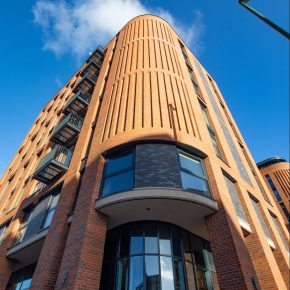
23rd April 2024
Trio of Senior products used in new Nottingham residential scheme
Solutions from Senior Architectural Systems have helped complete The Barnum – a new residential development on Nottingham’s Queen’s Road.
Posted in Aluminium Products, Articles, Building Industry News, Building Products & Structures, Building Systems, Case Studies, Curtain Walling, Doors, Glass, Glazing, Posts, Restoration & Refurbishment, Retrofit & Renovation, Walls, Windows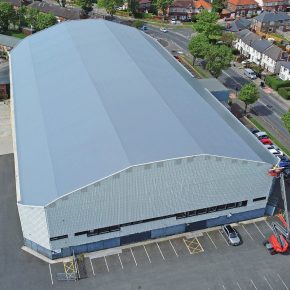
22nd April 2024
New EJOT role will develop strategic support for UK flat roofing sector
EJOT UK has taken a major step in the expansion of its support for the flat roofing market by appointing one of its most experienced building envelope fastening specialists as its first sector-dedicated business development manager.
Posted in Articles, Building Industry News, Building Products & Structures, Building Systems, Innovations & New Products, Posts, Recruitment, Restoration & Refurbishment, Retrofit & Renovation, Roofs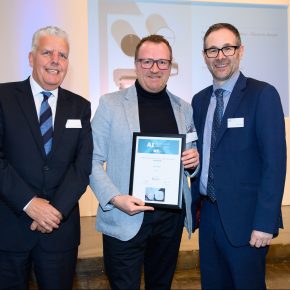
22nd April 2024
Access2 Wins ADSA-Sponsored Award at AI Specification Awards
Access2 clinched the ADSA-sponsored Product Design and Innovation Award (Electronic) at the AI Specification Awards 2024 on Thursday.
Posted in Access Control & Door Entry Systems, Architectural Ironmongery, Articles, Awards, Building Associations & Institutes, Building Industry Events, Building Industry News, Building Products & Structures, Building Services, Doors, Facility Management & Building Services, Information Technology, Innovations & New Products, Retrofit & Renovation, Security and Fire Protection, Video of the Week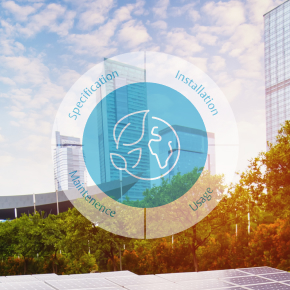
19th April 2024
ASSA ABLOY: Access solutions can impact sustainability performance across the full life-cycle of a building
Embedding sustainability within any organisation requires a broad, strategic perspective. Scrutiny should include the physical infrastructure itself: According to the IEA, buildings consume around 30% of global energy*. ASSA ABLOY has more…
Posted in Access Control & Door Entry Systems, Architectural Ironmongery, Articles, Building Industry News, Building Products & Structures, Building Regulations & Accreditations, Building Services, Case Studies, Doors, Facility Management & Building Services, Information Technology, Research & Materials Testing, Retrofit & Renovation, Security and Fire Protection, Sustainability & Energy Efficiency, Video of the Week
 Sign up:
Sign up: 